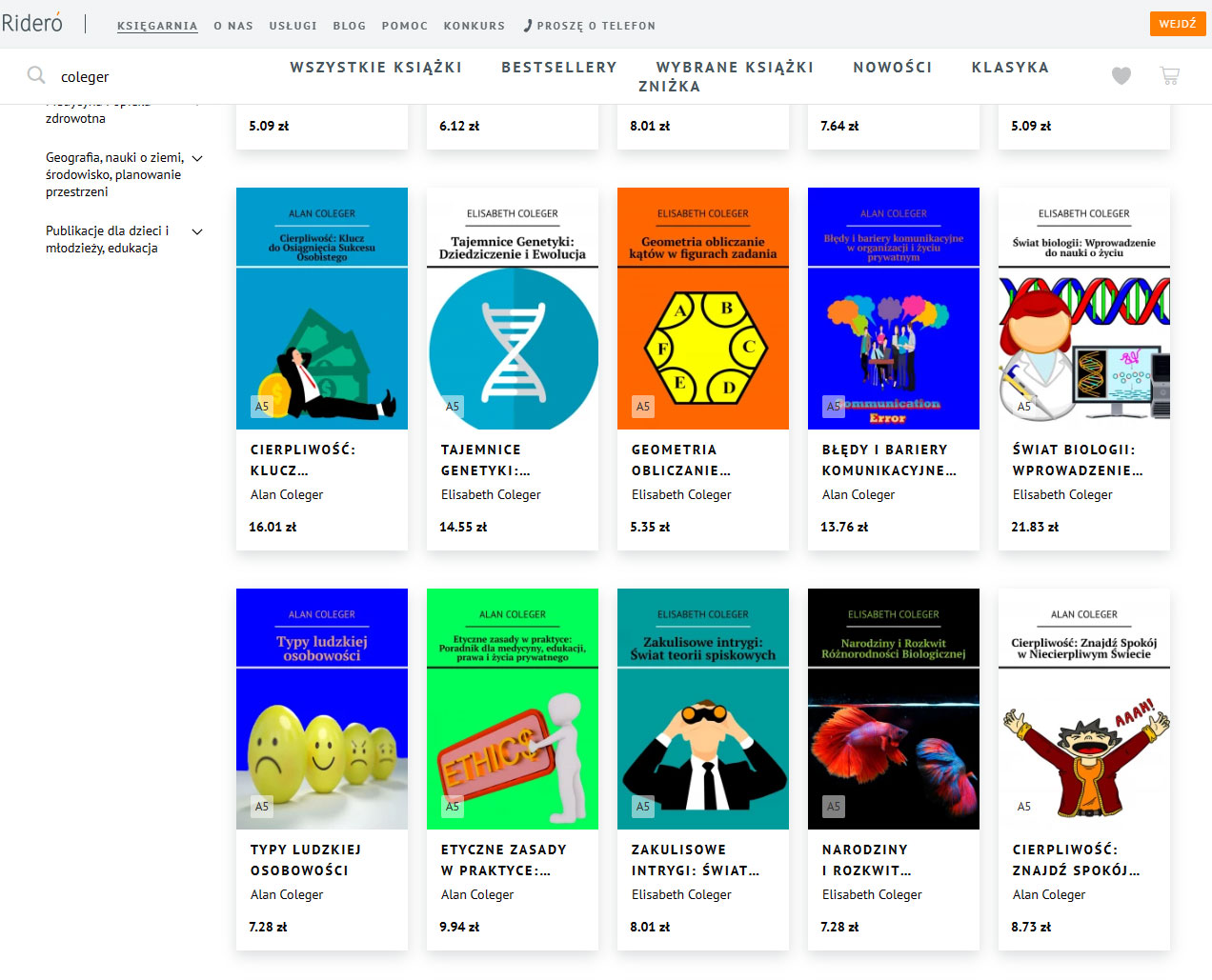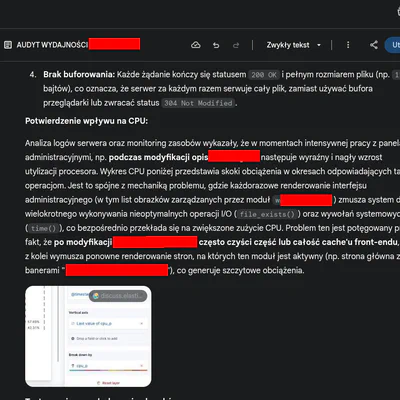In this article, I address the topic of content generation by artificial intelligence and its impact on the publishing market and, more broadly, on the quality of information available to readers. I present concerns about the quality and authenticity of AI-generated content in the context of disinformation and potential spam.
Table of Contents
Does the Polish publishing market have a problem with AI-generated junk publications?
In my opinion, the answer is yes, and it’s a serious one. As I discovered, the Polish publishing market is being massively flooded with junk publications generated by AI, with fabricated non-existent bibliographies and content with zero scientific value. What’s worse, in the era of fighting disinformation, reputable bookstores like HELION, PWN, and subscription services like Empik GO distribute this content in their offerings, whether knowingly or not, contributing to disinformation.
I decided to investigate how content marketing spam, called “AI slop” in the industry, entered bookstores and is probably being monetized. I would like this article to be my contribution to the discussion about the AI revolution and its dark side.
Meet Alan and Elisabeth – a couple of sleepwalking writers who probably don’t exist.
Hallucinating bots: the case of books pulled out of thin airGPT
Using the Empik Go subscription model (which allows you to familiarize yourself with publications I wouldn’t want to have physically in my library), I sometimes search for books by simply typing words, e.g., conspiracy theory. That’s how I came across the book Conspiracy theories: examples and their analysis by Elisabeth Coleger.
The author’s description sounds like generic output from a cheap language model:
“Fascinated by writing books and poems from an early age. The author’s publications are based particularly on her experience to date, imagination, and knowledge gained from other people willing to share their thoughts. Books published to date by the author are related to the following topics: 1. Poems. 2. Guides. 3. Romance. 4. Psychology. 5. Family relationships.”
I started searching for information about this author because the level of nonsense she wrote in her publication about conspiracy theories exceeded the capabilities of a clueless middle schooler. The book contains glaring factual errors. For example, real conspiracies are confused with conspiracy theories. Probably someone generating the text decided to add a few pages about conspiracies that were never the subject of any theory. Besides, AI models are happy to add some text about anything to fill the word limit.
You can clearly see whole paragraphs of repetitions just like in the case of a GPT-4 bot generating text. For example, HAARP repeated in several places is the same. Following the text, we have the impression that we’re reading the same fragments every 10 pages. On top of that, we have repeated banal formulas straight from chatGPT about the harmfulness of conspiracy theories and lack of scientific confirmation, which are copied to the point of boredom every few pages and repeated dozens of times:
“It’s worth noting that these conspiracy theories are widely criticized by scientists and experts who challenge the lack of evidence and logical inconsistencies in these theories. […] It’s worth noting that most conspiracy theories, including the one about the Illuminati, are based on loose speculation, interpretation of facts, and often serve to explain complex events in a simplified way.”
And so on in circles throughout the entire book, repeated dozens of times. This is an obvious signal of a generator. There are two options: either the book signed as Coleger was written by different authors, which I initially assumed, or it was written by AI. The whole time you get the impression that someone didn’t know what they wrote 10 pages earlier. This is classic hallucination of language models.
Bibliography pulled out of thin airGPT and factual nonsense
The book presents total nonsense such as that there’s a conspiracy theory about controlled obsolescence (planned product aging) or a conspiracy theory saying that it’s possible to manipulate people through social media algorithms. Which, as the author proves, is not true because there’s no evidence of a conspiracy by companies about product aging and making them difficult to service. According to the author, there’s also no evidence that social media algorithms can be used to manipulate people.
Of course, this is complete nonsense.
First, it’s been proven many times that there are toxic algorithms in social networks and behavioral targeting is used, behavioral stimulation, and the so-called surveillance capitalism is widely described, which monetizes our internet activity. Many authors have written about this, whom I refer to on the blog, including Ronald Deibert, co-creator of CitizenLab and author of Reset: Reclaiming the Internet for Civil Society.
Second, planned product obsolescence is proven, blocking access to spare parts and servicing, and blocking updates after the EOL (end of life) period, along with blocking and lawsuits regarding support for these products by people not associated with the manufacturer. Concrete confirmation that this is not a conspiracy theory is the fact that there are concrete responses to this problem in the form of legal solutions – e.g., banning planned product obsolescence by manufacturers and requiring replaceable batteries that are not built into the phone and non-replaceable.
Therefore, the presented alleged conspiracy theories are actually facts that were once conspiracy theories but became facts through their disclosure by whistleblowers or investigative journalists. Coleger omits this because language models don’t contain all knowledge about the real world. Hence, presenting facts, they can not so much falsify the picture of reality as create pseudo-facts in a very convincing way.
Non-existent books as bibliography
Elisabeth Coleger cites non-existent books in her bibliography. I found no trace of these publications on the Internet (Google SERP) or on Research Gate. Because I know ChatGPT and Google Bard technology, I know that particularly when it comes to social sciences, they can provide false bibliographies and invent connections between people and topics.
Coleger provides the following false sources as references – these are non-existent books:
Michał Chojak Conspiracy theories 2012
Marcin Ryszkiewicz, Conspirology. Conspiracy theories and their culture, 2015
Mariusz Nowak Conspiracy theories and their impact on society 2018
Jan Głowacki Conspiracy theories: genesis, development, implications 2015
Ewa Kowalska Conspiracy theories: psychological aspects and their impact on the individual 2014
Andrzej Wojciechowski Conspiracy theories: analysis, causes, consequences 2019
Jan Bondęga Conspiracies and secrets 2012
You can see that someone mindlessly copied everything that AI produced, including alleged sources to confirm the knowledge contained in the book. References are available at the end of each chapter in footnotes and at the end in the bibliography. Let’s not be afraid to say it: this is blatant disinformation and brazen misleading of potential readers.

Content marketing spam as a business model
A quick check shows that Elisabeth Coleger and Alan Coleger have written over a hundred books in a very short time: from psychology and personal development to Polish history, cosmology, and guides on various areas of life. Wide range of interests…
This is probably content marketing spam, which through content synonymization, automatic content generation by AI, rewriting existing publications, generates so much content and in such form that people accidentally come across these publications when searching by keywords.
A review of the diversity of these titles shows an analogy I know from work – this is a pattern used in spam under Google SERP (search engine result page) to attract people to fake spam pages where ads are placed. Here, however, monetization happens differently and is more sophisticated.
How do bookstores monetize spam? Through the subscription mechanism
One could say that PWN or HELION have so many thousands of similar and junk publications that they can’t monitor everything. The same could allegedly be said about EMPIK GO. However, this doesn’t explain at all that they have such products in their offer and de facto legitimize them with their brand.
The price from a few to several dozen zlotys (e.g., 5.09 PLN for access to a book written by Elisabeth) means that a person searching for them will be inclined, first, to buy, and in case of questionable quality, will give up on a complaint because it’s only a few zlotys.
Subscription as an ideal environment for spam
In the case of subscription services, the matter is even simpler and more cynical. A person in a monthly subscription has a certain number of slots to use. So we can borrow, for example, 8 books per month.
If we search for a publication by keywords, it’s very likely that we’ll simply download it and use the monthly slot. Part of the earnings for the book’s author comes from our subscription fee.
On the one hand, it seems that the existence of junk is not in the interest of subscription services, but it turns out that services providing subscription access make money from this. The more potential possible answers to customer queries, the better.
Because these books are rented by mistake, slots are used. Nobody complains about it or reviews it. The subscription service provider earns, and above all, the AI spam producer earns.
Keyword research as a littering strategy
Let’s look at the list of titles at the end of the article. Each bookstore has hundreds of thousands of books. If a person looking for a guide “how to get out of depression” or “introduction to neurobiology” – it’s highly likely that these titles were chosen based on keyword research and analysis of phrases searched on the internet.
This means they will be indexed and the person will get a result in Google SERP leading to the book. It’s highly likely that, like me, they’ll type in some words and test. My curiosity was rewarded by being able to show you this dump, and I struggled through reading and analyzing the selected book.
Of course, I present radical examples with a bibliography pulled out of thin air (this applies to the book I’m discussing). Such practices of using AI to generate content and books can be used to create the illusion of rich and diverse content that is optimized for search engines but doesn’t necessarily provide factual or educational value.
This is particularly important when we consider that AI-generated content can often be superficial, imprecise, or lacking deeper understanding of the topic. However, of course, you can also find other, more polished publications that are generated by AI. I know one person whose most of their doctoral dissertation is written by AI – of course with appropriately verified bibliography. This author is aware that AI often hallucinates.
Ridero IT Publishing – highway for spam-publishing

I don’t ultimately know who’s earning from Alan and Elisabeth’s publications. This is not the subject of my publication and analysis – it can of course be determined along with other projects of this company. However, you can quickly determine the publisher.
Ridero IT Publishing is a startup RIDERO from Yekaterinburg that allows you to assign an ISBN, create a cover, prepare an ebook, and most importantly, release it into publishing circulation at a low cost. Only thanks to this does it later appear in PWN bookstore and EMPIK GO.
In 2014, the service won 2nd place in the Russian IT Web Ready Generations 2014 startup competition, and in 2015 Ridero began operating in Poland and other European countries.
I’m not claiming that such books – if they’re well prepared factually – are bad. I’m writing about an extreme case that in my opinion falls under spam, and the book verification process unfortunately didn’t catch what I did. I encourage factual verification of books from the list below.
Ridero is not a bad service in itself. However, their business model doesn’t assume a book verification model that contemporary realities would require. It seems to me that this is already a task for lawyers and politicians to create such legal solutions that will oblige appropriate marking and filtering of spam.
Update January 2026: similar AI scheme on Youtube
In 2025, I wrote a text summarizing investigative journalism on Wojciech Dzierwa YT Channel without censorship, who, using SEO heist techniques, fills the Youtube channel with junk videos generated by AI. I encourage you to read the article because it shows the problem of algorithms recommending semantically low-quality content that is mass-generated by AI.
Sources
List of books by very talented and prolific authors the Colegers - Elisabeth and Alan
Alan Coleger Collection of guides for women and men
Alan Coleger Favorite sexual positions
Alan Coleger How to understand a woman
Alan Coleger Positive psychology in professional and personal life
Elisabeth Coleger How to understand a guy
Alan Coleger The power of patience
Alan Coleger How to tell when someone is lying?
Alan Coleger Everything we desire and strive for in life
Alan Coleger How to deal with stress at work
Elisabeth Coleger How to teach a child assertiveness
Alan Coleger How to stop wasting money
Elisabeth Coleger Everything we want to know about love
Elisabeth Coleger How to overcome addiction
Alan Coleger How to choose the right profession for yourself?
Elisabeth Coleger The difference between emotional hunger and love
Alan Coleger Everything about life after death
Alan Coleger What is procrastination and how to deal with it
Elisabeth Coleger Health and diseases: practical guide
Alan Coleger The most important events influencing Polish culture
Alan Coleger Introduction to positive psychology
Elisabeth Coleger The great book of biology: from botany to neurobiology
Alan Coleger What to do to be an optimist
Elisabeth Coleger Secrets of heredity: genetics in simple words
Elisabeth Coleger How to recognize and deal with a difficult mother-in-law
Elisabeth Coleger The world of animals: introduction to zoology
Elisabeth Coleger Fundamentals of molecular biology
Alan Coleger Patience and achieving success
Alan Coleger Everything we need to know to spice up our erotic life
Elisabeth Coleger Evolution: introduction to theory and evidence
Elisabeth Coleger Communication with customers
Alan Coleger What do guys think about but never tell a woman?
Alan Coleger The era of social realism: art and culture in Poland under the PRL regime
Alan Coleger Energy in energy vampires: analysis and consequences
Elisabeth Coleger Molecular biology: fundamentals and application
Alan Coleger Errors and communication barriers in organization and private life
Elisabeth Coleger The mysterious world: parapsychology and science
Elisabeth Coleger Fundamentals of geometry part 2
Alan Coleger Art and culture from prehistoric Poland to the Second Polish Republic
Alan Coleger Personal success: psychology of development, mental health and self-realization
Alan Coleger Discovering happiness: positive psychology for health and psychotherapy
Elisabeth Coleger Causes of excessive appetite and how to deal with it
Alan Coleger The future of artificial intelligence
Elisabeth Coleger Secrets of the world of microorganisms: introduction to microbiology
Alan Coleger Achieving success and harmony: path of personal development
Elisabeth Coleger Effective communication with customers
Elisabeth Coleger Adventures of romantic klutz Kacper
Alan Coleger Polish art and culture in the shadow of war and hope: World War II and the post-war period
Alan Coleger Errors and communication barriers in everyday life
Alan Coleger Impostor syndrome, what it is and how to deal with it
Alan Coleger Happiness and success: guide to positive psychology in life and work
Alan Coleger The Diderot effect, what it is and how to deal with it
Alan Coleger What to do to look and feel younger?
Elisabeth Coleger Secret mechanisms of reproduction: discovering the secrets of life
Alan Coleger What to do to prevent conflicts and how to deal with them
Alan Coleger How to deal with aggressive people
Alan Coleger Patience: key to achieving personal success
Elisabeth Coleger Secrets of genetics: heredity and evolution
Elisabeth Coleger Geometry calculating angles in figures exercises
Alan Coleger Errors and communication barriers in organization and private life
Elisabeth Coleger The world of biology: introduction to the science of life
Alan Coleger Types of human personality
Alan Coleger Ethical principles in practice: guide for medicine, education, law and private life
Elisabeth Coleger Behind-the-scenes intrigues: world of conspiracy theories
Elisabeth Coleger Birth and flourishing of biological diversity
Alan Coleger Patience: find peace in an impatient world
Alan Coleger Effective time management
Alan Coleger Errors and communication barriers in organization
Elisabeth Coleger Forgotten conspiracies: hidden secrets of the world
Alan Coleger Protection against energy vampires: how to preserve your energy
Alan Coleger The power of mind: key to mental health, self-development and achieving success
Alan Coleger How to motivate an employee to more efficient and effective work
Alan Coleger Discovering genius: developing creativity and innovation
Elisabeth Coleger Secrets of the brain: introduction to neurobiology
Alan Coleger How to negotiate effectively, negotiation techniques from A to Z
Alan Coleger How to be a happy single
Elisabeth Coleger How to understand a man and how to tell when he’s lying to us
Alan Coleger Conscious awakening: how to avoid energy vampirism and develop
Alan Coleger How to effectively manage your own life?
Alan Coleger How to impress a woman and make her fall in love with you
Alan Coleger Immigration and refugees: disputes, security, economy, integration, future
Alan Coleger Patience: key to success and personal development
Alan Coleger Poland between partitions and independence: culture and art in the Second Polish Republic
Alan Coleger What to do to lose weight quickly without hurting yourself?
Alan Coleger Polish culture in the times of World War II, PRL to the present
Elisabeth Coleger How to turn on a woman
Alan Coleger How to correctly convey content to be understood
Alan Coleger Fundamentals of accounting
Alan Coleger Searching for identity: Polish culture in the shadow of partitions and occupation
Elisabeth Coleger Parapsychology: understanding extraordinary abilities in the context of science and society
Elisabeth Coleger Flourishing of nature: botany for everyone
Elisabeth Coleger Conspiracy theories: examples and their analysis
Alan Coleger Life energy: analysis of energy vampires
Alan Coleger Energy vampires in relationships: how to protect yourself and loved ones
Alan Coleger Secrets of happiness: introduction to positive psychology
Alan Coleger Artificial intelligence: future or threat?
Elisabeth Coleger Biotechnology: introduction to modern techniques and applications
Alan Coleger Paths to happiness: achieving balance in mental health, motivation and social relations
Alan Coleger Ethical principles in practice: guide for politics, education, medicine, law and private life
Elisabeth Coleger Causes of excessive appetite
Elisabeth Coleger Fundamentals of geometry
Alan Coleger Cleansing and developing consciousness: path to energetic harmony
Elisabeth Coleger Geometry calculating area, perimeter and height of figures
Elisabeth Coleger Biology in a nutshell: introduction and secrets of the cell
Alan Coleger Energy vampirism: spiritual perspective and considerations
Alan Coleger Polish art and culture: from antiquity to baroque
Elisabeth Coleger Introduction to parapsychology
Alan Coleger Positive interpersonal relationships
Alan Coleger Collection of surprising syndromes
Alan Coleger Positive psychology: your key to success
Alan Coleger Best ways to motivate yourself to work remotely and in our workplace
Alan Coleger Patience: key force in everyday life
Elisabeth Coleger Fundamentals of geometry part 1
Alan Coleger Achieve success and personal balance
Alan Coleger Ethical principles in practice: guide for business, medicine, education, law and private life
Elisabeth Coleger Pain of loneliness
Alan Coleger The most important types of human personality
Elisabeth Coleger Anatomy and physiology: key to understanding the body
Alan Coleger Meanders of patience: discovering peace in the face of challenges
Elisabeth Coleger Extended geometry
Alan Coleger Unusual but effective ways to motivate employees to work
Elisabeth Coleger Manipulation methods and dealing with difficult situations in communication
Alan Coleger Problems with meeting new people, how to deal with it
Alan Coleger Transfer syndrome, what it is and how to deal with it
Alan Coleger Dispute regarding attitude towards refugees and immigrants and issues of economic security and integration.
Alan Coleger Problems related to communication and meeting new people, how to deal with it
Alan Coleger The difference between precrastination and procrastination, what they are and how to deal with them
Alan Coleger How to prepare good advertising and reach the customer
Alan Coleger How to choose the right profession for your personality type
Alan Coleger What is precrastination and how to deal with it
Alan Coleger Burnout syndrome and stress, what they are and how to deal with them
Edgar Enderson Alan Coleger Unusual syndromes that affect our behavior
Edgar’s book list - another talented and prolific author. I’m including the list below only so that someone can possibly verify these publications in terms of merit. I note that the publication dates of most of Edgar Enderson’s books are varied relative to chatGPT publications in 2023.
Edgar Enderson How to rebuild lost trust?
Edgar Enderson Unnoticed strings: psychology of manipulation
Edgar Enderson How to exercise your own patience
Edgar Enderson English basic level
Edgar Enderson How to motivate a woman to have sex
Edgar Enderson The art of building positive relationships
Edgar Enderson What to do to have sex more often, how to motivate a woman to have it and how to increase pleasure in bed
Edgar Enderson How to meet new friends
Edgar Enderson How to control anger
Edgar Enderson Image and reputation: building authentic success
Edgar Enderson Soft skills in practice
Edgar Enderson Cosmology: mysteries of the universe
Edgar Enderson What to do to avoid trouble?
Edgar Enderson Proven ways to learn easier and absorb knowledge more effectively
Edgar Enderson Kings of Poland: from Mieszko I to Stanisław August Poniatowski
Edgar Enderson Reputation and relationships: key to business success
Edgar Enderson Facts and myths about SARS-CoV-2
Edgar Enderson How to make money on the Internet
Edgar Enderson Image goals: path to effective image management
Edgar Enderson Breakthrough in image: building authenticity
Edgar Enderson Social justice: inequalities, discrimination and challenges in contemporary society
Edgar Enderson Everything we want to know about sexual attraction
Edgar Enderson Everything about being a manager, how to become one and how to find one among employees
Edgar Enderson Kings of Poland: from Mieszko I to Władysław Jagiełło
Edgar Enderson Stockholm syndrome, what it is, its symptoms and how to treat it
Edgar Enderson Communication without borders: resistance to manipulation and building strong relationships
Edgar Enderson English basic level part 1
Edgar Enderson Journey through the universe: from cosmology to extraterrestrial life
Edgar Enderson What to do not to be robbed while traveling
Edgar Enderson Image in times of crisis
Edgar Enderson How to deal with people in our workplace
Edgar Enderson Great cosmic journeys: introduction to cosmology
Edgar Enderson Polish-Bolshevik war 1919—1920
Edgar Enderson How to save company budget
Edgar Enderson Conflict and striving for alliance: Cossack-Tatar war
Edgar Enderson Introduction to logic: from basics to metaphysics, epistemology, philosophy of language, mathematics and science
Edgar Enderson What to do to sleep at night
Edgar Enderson Curiosities about drugs
Edgar Enderson How to effectively convince others to your own opinion
Coleger Alan Enderson Edgar Unusual syndromes that affect our behavior
Edgar Enderson How to deal with stress in everyday life


